Mitt Romney Campaign Postmortem
The collapse of Mitt Romney’s bid for the presidency brings the inevitable question: What went wrong? Michael Luo gives a pretty good explanation.
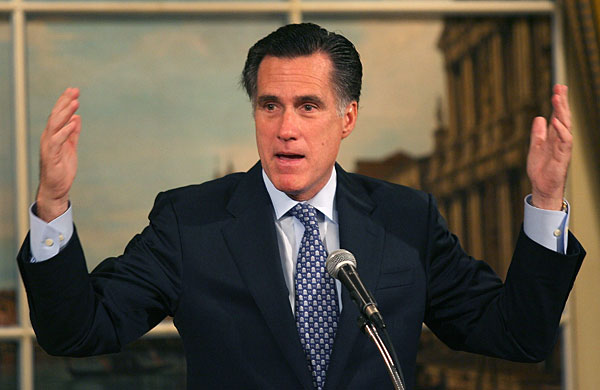
If Mr. Romney’s campaign were condensed to one of his trademark PowerPoint presentations, it would have had all the bullet points foretelling success: a multimillionaire candidate willing to relinquish his fortune to run, an unsettled Republican field and a candidate whose championing of conservative positions could motivate the party’s base.
Yet Mr. Romney’s advisers acknowledged Thursday an array of tactical missteps and miscalculations. Perhaps most significantly, they conceded that they had failed to overcome doubts about Mr. Romney’s authenticity as they sought to position him as the most electable conservative in the race, a jarring contrast to his more moderate record as governor of Massachusetts. And during the January nominating contests, as his opponents attacked his shifting on issues, polls showed his favorability ratings plummeting.
Mr. Romney spent more than $35 million of his own money trying to get himself elected, but his campaign faced challenges from the start, some from obstacles beyond his control.
Suspicions about Mr. Romney’s Mormon faith consumed his campaign early on, only to seem to fade from view. But his advisers and outside experts agree that the unease ultimately helped pave the way for Mike Huckabee, a former Southern Baptist pastor, to emerge from the backbench of the Republican field to win the Iowa caucuses, a central, costly goal of Mr. Romney’s strategy. Then Mr. Romney’s aides failed to anticipate the collapse of Rudolph W. Giuliani’s candidacy, leaving no one to halt Senator John McCain’s resurgence among moderate Republicans and independents.
[…]
But in an election cycle in which authenticity is an overriding concern among voters, the perception of Mr. Romney remaking himself into a Reagan-like figure through his positioning on issues like abortion rights and gun control exposed him to biting, often mocking attacks from his rivals, who were almost universal in their scorn of him. His fellow Republicans used the flip-flopping accusations to reframe everything he did. Even in the final hours of Mr. Romney’s candidacy, Mr. McCain was running advertising suggesting Mr. Romney had shifted radically in his view of Ronald Reagan.
[…]
But Mr. Gage acknowledged that in Mr. Romney’s rush to beat back the attacks questioning his conservative credentials, he may have swung too far in the other direction, ultimately taking some of the most-pronounced stands against illegal immigration and social issues. “Maybe we overcompensated,” Mr. Gage said.
The old joke that “The secret of success is sincerity. Once you can fake that you’ve got it made” seems invented for Romney. By most accounts, he’s a decent fellow. But, like the Al Gore of 2000, Romney never got past the sense that he was reinventing himself on the fly, making him seem both insincere and insecure.
It’s true that, absent some bad luck, he might have nonetheless won. None of us were predicting Huckabee’s emergence from nowhere to be the standard bearer of social conservatives. Giuliani and McCain started the race as the front-runners and may very well have divided the moderate security voter wing had Giuliani’s campaign not imploded.
I disagree with McCain on several issues and with Huckabee on a whole lot more. Yet I have little doubt that they actually believe what they’re telling me. That was never the case with Romney.
UPDATE: Howard Fineman adds,
I have covered a lot of presidential campaigns, and I can’t think of one that so lost its way-so expensively-as that of the former governor of Massachusetts. A board room and business favorite, a man with a Midas managerial touch, he was widely admired and even beloved. But he was a Republican of an old moderate school-that of his own father-and, like George W. Bush, Romney the Younger decided that he had to jettison all that he was to become something that he was not.

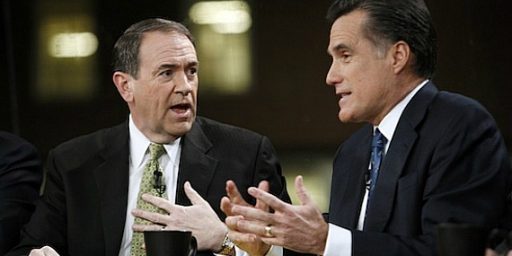
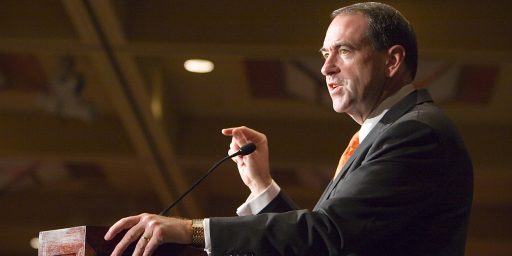
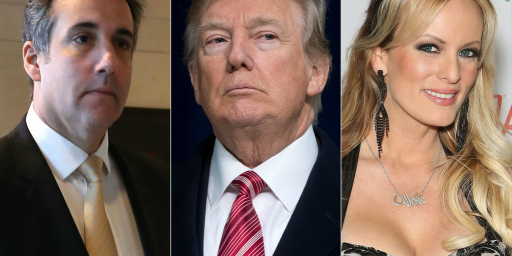

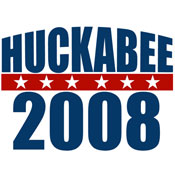
I’ve said before that I have ceased to understand Republican primary voters and I am particularly unable to understand conservatives who supported Romney. His was a candidacy built with a “Do-It-Yourself Conservative” Kit.
Another republican politician who failed to serve his country when called to do so, and happy to brand everyone who disagrees with his position on the war a traitor, bites the dust. Good riddance.
All this analyzing what went wrong with Flipper is funny when it’s so simple. He is a plastic phony. He made himself one thing when he wanted to be governor of Massachusetts and another thing entirely when he wanted to be President of the United States. He has no principles. He’ll say and do anything to get what he wants. People saw through that. And thank goodness they did! America really dodged a bullet with Mitt Romney.
Indeed, the utter transparency with which he completely reversed his standing on many key GOP platform points was going to torpedo him eventually anyway, but I found a link to another post-mortem at Oliver Willis’ that looks deeper at one particular point Luo just runs by:
Despite the fact that perennially-wrong dipsticks like Hugh Hewett insisted repeatedly that the only issues about Mittster’s religion would come from the left…
However, the very next statement in that article raises another issue:
A lot of GOP bigwigs are so completely insulated from actual citizens that they honestly don’t think the economy is that big a deal. Outside of RP, I don’t think any of the GOP contenders ever talked it up until after they’d already gone through all their 9-11, immigration, and left-bashing talking points. And small wonder, since to draw attention to the fact that the rich are the only ones not living 1 or 2 paychecks from disaster can only highlight that the only blame for this lies squarely on the shoulders of Bush’s horrific economic policies. And criticising Bush during the Primaries just ain’t gonna work.
Tis a shame. Given that McCain and Huckabee, both, have adjusted their positions, eg flip-flopped, it is they who I never trusted and still don’t. Of course, I’m much more trusting of Mormon morality than I am of quasi-Christian (McCain) or evangelical Christian (Huckabee). And I say that as an atheist.
I think most telling were polls conducted a while ago asking what group (identity politics) voters would most likely vote, or not vote for. IIRC, Mormons topped out on the negative with something like 40% saying there was no way. More than anything, I think unstated, perhaps even unconscious, religious bigotry doomed Romney’s run.